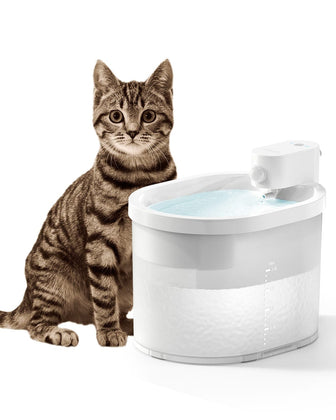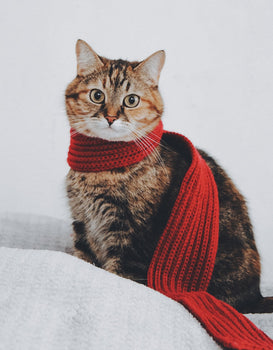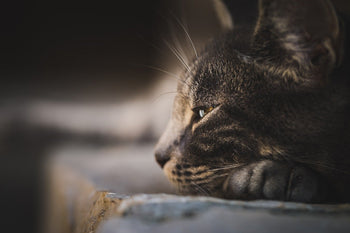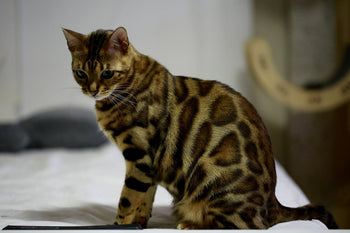Cats are known for their curious nature and playful demeanor, but there is one thing that seems to strike fear into their hearts: cucumbers. Videos of cats jumping and running away in terror after seeing a cucumber placed behind them have become popular on social media, leaving many people wondering why this is happening. In this article, we will explore the reasons behind cats' fear of cucumbers and the effects of scaring them with this vegetable.
One theory behind cats' fear of cucumbers is that they mistake them for snakes. Cats have a natural instinct to be wary of snakes, which are a common predator in their natural environment. When they see a cucumber, which has a similar shape and texture to a snake, it triggers their fear response. This theory is supported by the fact that cats do not seem to be afraid of other vegetables or objects, such as carrots or toys.
Another possible reason for cats' fear of cucumbers is that they are caught off guard by the sudden appearance of an unfamiliar object. Cats are creatures of habit and routine, and any unexpected change in their environment can be stressful for them. Placing a cucumber behind them while they are eating or sleeping can be a jarring experience, causing them to react with fear and anxiety.
Why Cats Are Afraid of Cucumbers: Exploring the Phenomenon

Key Takeaways
Cats' fear of cucumbers may be due to mistaking them for snakes.
Placing cucumbers behind cats can cause them to react with fear and anxiety.
It is important for cat owners to be mindful of their pets' reactions to new objects and environments.
Reasons Behind Cats' Fear of Cucumbers
Cats are known to have a fear of cucumbers, which has become a popular topic on social media. While some people find it amusing to scare their cats with cucumbers, it is important to understand the reasons behind this fear.
Predatory Instincts and Surprise Responses
Cats have a strong predatory instinct, and they are always on the lookout for potential threats. When a cucumber is placed behind a cat without its knowledge, it triggers a surprise response that is similar to what they would experience in the wild. The sudden appearance of an unknown object can trigger a fight or flight response, and in most cases, cats choose to flee.
Territorial Nature and Perceived Threats
Cats are territorial animals, and they are always on guard to protect their territory. When a cucumber is placed in their territory, they perceive it as a threat. The sudden appearance of an unknown object in their space can cause them to feel vulnerable and anxious. This can lead to a fear response, where they try to avoid the object at all costs.
Cucumbers and Snake Resemblance
Cucumbers have a similar shape and color to snakes, which are natural predators of cats. This resemblance can trigger a fear response in cats, as they associate the cucumber with a potential predator. This is why cats may react differently to other objects that are similar in appearance to snakes.
Importance of Not Scaring Cats
While some people find it amusing to scare their cats with cucumbers, it is important to understand that this can be harmful to their well-being. Scaring a cat can cause them to become anxious and stressed, which can lead to health problems. It is important to treat cats with respect and kindness, and to avoid scaring them for entertainment purposes.
In conclusion, cats' fear of cucumbers is a natural response that is triggered by their predatory instincts, territorial nature, and the resemblance of cucumbers to snakes. It is important to understand the reasons behind this fear and to avoid scaring cats for entertainment purposes.
Effects of Scaring Cats With Cucumbers
Negative Consequences on Cat Well-being
Scaring cats with cucumbers may seem like harmless fun, but it can actually have negative consequences on their well-being. When a cat is scared, their body goes into fight or flight mode, which can cause a spike in their heart rate and blood pressure. This can be especially dangerous for older cats or cats with pre-existing health conditions.
In addition, scaring a cat with a cucumber can cause them to associate negative feelings with their environment. This can lead to increased stress and anxiety, which can have long-term effects on their behavior and overall well-being.
Importance of Safe Environments
Creating a safe and stress-free environment for cats is crucial for their physical and mental health. It's important to provide them with a space where they feel secure and comfortable. This includes providing them with plenty of hiding spots, toys, and scratching posts.
Owners should also be aware of their cat's triggers and avoid exposing them to situations that may cause fear or anxiety. This includes avoiding scaring them with cucumbers or any other objects.
By creating a safe and stress-free environment, owners can help ensure their cat's overall well-being and happiness.
Tips for Cat Owners
Alleviating Fear of New Objects
Cats are naturally curious creatures, but they can also be easily frightened by unfamiliar objects. If you want to introduce new objects into your cat's environment, it's important to do so gradually. Start by placing the object in a room where your cat spends a lot of time and allow them to approach it on their own terms. If your cat seems hesitant, try placing treats or toys near the object to encourage them to investigate.
It's also important to remember that not all cats will react the same way to new objects. Some cats may be more fearful than others, and it's important to respect their boundaries. If your cat seems extremely fearful or anxious, it's best to remove the object and try again at a later time.
Creating a Stress-Free Environment
Cats are sensitive animals and can easily become stressed in certain environments. To create a stress-free environment for your cat, make sure they have access to plenty of hiding spaces and high perches where they can observe their surroundings. Providing plenty of toys and scratching posts can also help to alleviate stress and keep your cat entertained.
Another important factor in creating a stress-free environment for your cat is ensuring they have access to clean water. Cats are prone to dehydration, and a lack of water can lead to a variety of health problems. Consider investing in a high-quality water fountain to encourage your cat to drink more water.
Related Posts:

Conclusion
In conclusion, while it may seem amusing to scare cats with cucumbers, it is not a recommended practice. The fear of cucumbers in cats is likely a result of their natural instinct to be cautious of unfamiliar objects. It is important to respect a cat's boundaries and avoid causing unnecessary stress or anxiety.
While there is limited scientific research on the topic, anecdotal evidence suggests that the sudden appearance of cucumbers can trigger a fear response in some cats. However, it is important to note that not all cats will react in the same way. Some cats may not be bothered by the presence of cucumbers at all.
As with any animal behavior, it is important to approach cats with respect and understanding. If you are concerned about your cat's reaction to cucumbers or any other object, it is recommended to consult with a veterinarian or animal behaviorist for guidance.
Overall, while the fear of cucumbers in cats may be an interesting phenomenon, it is important to approach the topic with a neutral and knowledgeable perspective. By understanding a cat's natural instincts and respecting their boundaries, we can help ensure a happy and healthy relationship with our feline companions.
Frequently Asked Questions
What triggers a fear response in cats when they see cucumbers?
The exact trigger for this fear response is not fully understood. However, some experts suggest that it may be related to the unexpected appearance of the cucumber. Cats are naturally cautious animals and may be startled by unfamiliar objects suddenly appearing in their field of vision.
Are there any scientific explanations for cats' aversion to cucumbers?
There is currently no scientific research specifically focused on cats' fear of cucumbers. However, some experts believe that this fear response may be related to cats' instinctual fear of snakes. Cucumbers, when placed on the ground, may resemble snakes to cats due to their similar shape and texture.
Is there a psychological reason behind cats' fear of cucumbers?
It is possible that there may be a psychological reason behind cats' fear of cucumbers. Some experts suggest that this fear response may be related to a form of conditioning. If a cat has had a negative experience with cucumbers in the past, such as being startled by one, it may develop a fear response to this object.
How do cats typically react when confronted with cucumbers?
When confronted with cucumbers, cats may exhibit a variety of fear responses. These can include jumping, hissing, or running away. In some cases, cats may freeze in place or become aggressive.
Can the fear of cucumbers in cats be related to their instinctual fear of snakes?
As mentioned earlier, it is possible that cats' fear of cucumbers may be related to their instinctual fear of snakes. This fear response may be a result of evolutionary adaptations that have helped cats avoid potential predators in the wild.
What are the potential risks of intentionally scaring cats with cucumbers?
Intentionally scaring cats with cucumbers can be harmful and is not recommended. This can cause unnecessary stress and anxiety for the cat, and may even lead to physical harm if the cat becomes aggressive or injures itself while trying to escape. It is important to always treat animals with respect and avoid causing them unnecessary distress.

















